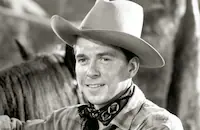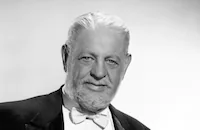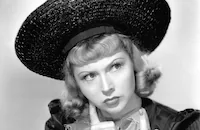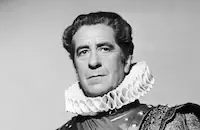Going Places

Brief Synopsis
Cast & Crew
Ray Enright
Dick Powell
Anita Louise
Allen Jenkins
Ronald Reagan
Walter Catlett
Film Details
Technical Specs

Synopsis
Peter Mason, a salesman in a sporting goods store, calls his boss Frome's attention to the need for more advertising. Frome points out that they have a contract with steeplechase jockey Peter Randall to represent them, but he is in Australia. Franklin Dexter, a fellow salesman, proposes that Peter pose as Randall to represent the store at the Maryland Steeplechase. Although he cannot ride, Peter reluctantly agrees. At the hotel, Ellen Parker and her aunt, Cora Withering, introduce themselves to Peter and invite him to a party at their home. Two racetrack habituées, Maxie and Droopy, also introduce themselves to Peter. They have seen Jeepers Creepers, an unmanagable horse who will only respond to the song Jeepers Creepers. They want to bet on the horse and think Peter will be able to manage him. Peter refuses, protesting that he cannot really ride, but at the Witherings' party, he accidentally lands on Jeepers Creepers and rides him. Ellen is impressed and as Peter is in love with her, he agrees to ride her horse, Lady Ellen, in the race. Maxie and Droopy, however, force Peter into riding Jeepers Creepers. Peter arranges for the horse's trainer, Gabe, to follow the race with a band playing his song. Despite the fact that the horse leaves the track to follow the band, Peter wins the race. Frome promotes Peter, who makes up with Ellen. Only Dopey is unhappy because he bet on another horse.

Director
Ray Enright
Cast

Dick Powell

Anita Louise

Allen Jenkins

Ronald Reagan

Walter Catlett

Harold Huber

Larry Williams

Thurston Hall

Minna Gombel

Joyce Compton

Robert Warwick

John Ridgely
Joe Cunningham

Eddie Anderson
George Reed

Louis Armstrong
Maxine Sullivan
Ferdinand Munier
Sidney Bracy
Janet Shaw

Rosella Towne
John Harron
Charlotte Treadway
Jesse Graves

Ward Bond
Eddy Chandler
Frank Mayo
Crew
Earl Baldwin
Hugh Cummings
Leo F. Forbstein
Benjamin Glazer
Ray Heindorf
Sig Herzig
Jesse Hibbs
Clarence Kolster
Robert B. Lee
Maurice Leo
Johnny Mercer
Frank Perkins
Hugh Reticker
Howard Shoup
Arthur L. Todd
Jerry Wald
Jack L. Warner
Harry Warren

Film Details
Technical Specs

Award Nominations
Best Song
Articles
Going Places (1938)
In Going Places, Powell plays a sporting goods salesman who poses as a famous jockey to get in with the upper-class horse set. He ends up astride Jeepers Creepers in a big race with Armstrong and a group of musicians riding alongside in a wagon so Satchmo can play his trumpet and sing to the horse! At a party, in another unlikely situation for a horse groom, Armstrong leads an all-black orchestra and a group of black singers and dancers in a production number called "Mutiny in the Nursery."
Going Places, based on a play by Victor Mapes and William Collier, was filmed three times before, first as a silent called Hottentot (1923), then as a talkie of the same title (1929) and next as a Joe E. Brown vehicle called Polo Joe (1936). Powell, still in the lightweight-crooner phase of his career, was six years away from reinventing himself as a hard-boiled detective in Murder, My Sweet (1944). Ronald Reagan has a supporting role in Going Places as a stable owner's playboy son.
Louis Armstrong (1900-1971) emerged as one of the world's greatest jazz stars in a career that spanned more than a half-century. He made his movie debut in Ex-Flame (1931). Among his other notable film appearances are Cabin in the Sky (1943), A Song Is Born (1948), The Glenn Miller Story (1954), High Society (1956), Satchmo the Great (1957) and Hello Dolly! (1969).
Producer: Hal B. Wallis
Director: Ray Enright
Screenplay: Sig Herzig, Maurice Leo, Jerry Wald, from the play The Hottentot by William Collier, Sr. and Victor Mapes
Cinematography: Arthur L. Todd
Art Direction: Hugh Reticker
Costume Design: Howard Shoup
Original Music: Johnny Mercer, Harry Warren, Sam Perry (uncredited), Heinz Roemheld (uncredited)
Editing: Clarence Kolster
Principal Cast: Dick Powell (Peter Mason, aka Peter Randall), Anita Louise (Ellen Parker), Allen Jenkins (Droopy), Ronald Reagan (Jack Withering), Walter Catlett (Franklin Dexter), Louis Armstrong (Gabriel).
BW-84m.
by Roger Fristoe

Going Places (1938)
Ronald Reagan, 1911-2004 - TCM Remembers Ronald Reagan
Ronald Reagan, the actor turned elected official whose fascinating career saw him develop as a contract player for Warner Brothers studios, to a politician who fulfilled his ambitions by becoming the 40th President of the United States, died at his home in Los Angeles on June 5 after a long battle with Alzheimer's disease. He was 93.
He was born Ronald Wilson Reagan on February 6, 1911 in Tampico, Illinois to John and Nelle Reagan. When Reagan was nine, his family settled down in the small community of Dixon, about 100 miles west of Chicago. After high school, Reagan enrolled in Eureka College, a small Christian school near Peoria. He graduated in 1932 with a degree in Economics, and pursued a career in broadcasting. His first gig was as a part-time announcer at WOC in Davenport, Iowa. Within a year, WOC had merged with its big-sister station, WHO in Des Moines, and Reagan was hired as a sports announcer.
In the spring of 1937, Reagan drove to Southern California to catch the Chicago Cubs in spring training on Santa Catalina Island. While he was in California, he wrangled a screen test and signed a contract for $200 a week with Warner Brothers. His film debut was rather inauspicious; he portrayed a radio announcer in an innocuous comedy Love is on the Air (1937). He made a few more "B" programmers like Hollywood Hotel (also 1937), and Girls on Probation (1938), before getting his first prominent role opposite Bette Davis in the popular tearjerker, Dark Victory (1939).
Although he seldom got credit for being a good actor, there was no denying that Reagan held his own given the right material: Knute Rockne, All American as the doomed Notre Dame football hero George "The Gipper" Gipp, where he delivered the film's immortal line "Win one for the Gipper!"; Santa Fe Trail in which he ably supports Errol Flynn in one of the boxoffice hits of its era (both 1940); Kings Row (1941), featuring one of his finest performances as a small-town playboy whose legs are amputated by a careless surgeon; and Desperate Journey (1942) where he again supported Flynn in an exciting action picture.
Due to his poor eyesight, Reagan didn't see any action in World War II, so the studio heads assigned him to star in a series of patriotic films produced by the First Motion Picture Unit of the Army Air Forces in Culver City. Between 1942-45, Reagan starred in over 400 of these films. After the war, Reagan still found some good roles: The Voice of the Turtle (1947) proved he had a deft hand at light comedy opposite Eleanor Parker; The Hasty Heart (1949) offered another underrated performance as he ably portrayed the Yank in John Patrick's much heralded wartime play; and Storm Warning (1950) was a slick melodrama that cast Reagan as a crusading District Attorney determined to bring the KKK in a small southern town, with the help of Doris Day and Ginger Rogers!
It was around this time that Reagan became involved in politics. In 1947, he began a five-year term as president of the Screen Actors Guild (SAG), and testified in October of that year before the newly formed House Un-American Activities Committee (HUAC). He identified suspected Communists Larry Parks, Howard Da Silva and Alexander Knox, all of whom were subsequently called to testify, and subsequently blacklisted. Later records showed Reagan was so concerned about the Communist influence in Hollywood, that he became an FBI informer.
As Reagan became steeped in his political career, his parts throughout the '50s became inferior: the notorious Bedtime for Bonzo (1951); the coy "sex" comedy She's Working Her Way Through College (1952) that cast him as a college professor who romances a stripper! (Virginia Mayo); Cattle Queen of Montana (1955), a sluggish Western that even the redoubtable Barbara Stanwyck couldn't save; and finally Hellcats of the Navy (1957), a stodgy war picture that would be his only film that co-starred his wife Nancy (Davis).
Television offered some salvation. For eight years, (1954-62), Reagan served as the host of General Electric Theater, a televised series of dramas. He also found a niche as GE's goodwill ambassador to employees and to civic and business groups around the country, furthering his taste and honing his craft as a public official. By the mid '60s, Reagan would move into politics entirely, save for one last film, the thrilling The Killers (1964), Reagan's only known villainous role, as a murderous gangster. That same year, he actively campaigned for Republican Presidential candidate Barry Goldwater, although Goldwater lost to Lyndon B. Johnson.
Reagan whose profile was riding high, had cemented his future as a successful politician. In 1966, he ran against incumbent Governor Pat Brown for the state of California and won, serving successfully for two terms until 1974.
Reagan began an all-out, two-year drive to wrest the 1976 nomination from incumbent Gerald R. Ford, an appointed vice president who became president on the resignation of Nixon. Reagan fell short by a handful of delegates to the Republican national convention. But Ford lost to Jimmy Carter, and Reagan became the front-runner to challenge Carter in 1980. After defeating Carter, Reagan held two terms as President of the United States (1981-89). After his second term was over, he retired quietly in California. In 1994, it was revealed to the media that Reagan was suffering from Alzheimer's disease; he had been kept out of the public eye since then.
He was married briefly to actress Jane Wyman (1940-48), and had two children; a daughter Maureen and an adopted son, Michael. In 1952, he married a budding film starlet, Nancy Davis, who bore him two more children; a daughter, Patty; and a son, Ronald Jr. Ronald Reagan is survived by Nancy, Michael, Patty and Ron Jr. His daughter Maureen died of Melanoma in 2001 at the age of 60.
by Michael T. Toole
Ronald Reagan, 1911-2004 - TCM Remembers Ronald Reagan
Quotes
Trivia
Notes
Harry Warren and Johnny Mercer's song "Jeepers Creepers" was nominated for an Academy Award. Two earlier films, both entitled The Hottentot, were based on the same source. Thomas H. Ince Productions made a version in 1923 starring Douglas MacLean, and Roy Del Ruth directed the story for Warner Bros. in 1929, starring Edward Everett Horton and Patsy Ruth Miller (see AFI Catalog of Feature Films, 1921-30; F2.2598 and F2.2599).

Miscellaneous Notes
Released in United States Winter December 31, 1938
Released in United States Winter December 31, 1938














